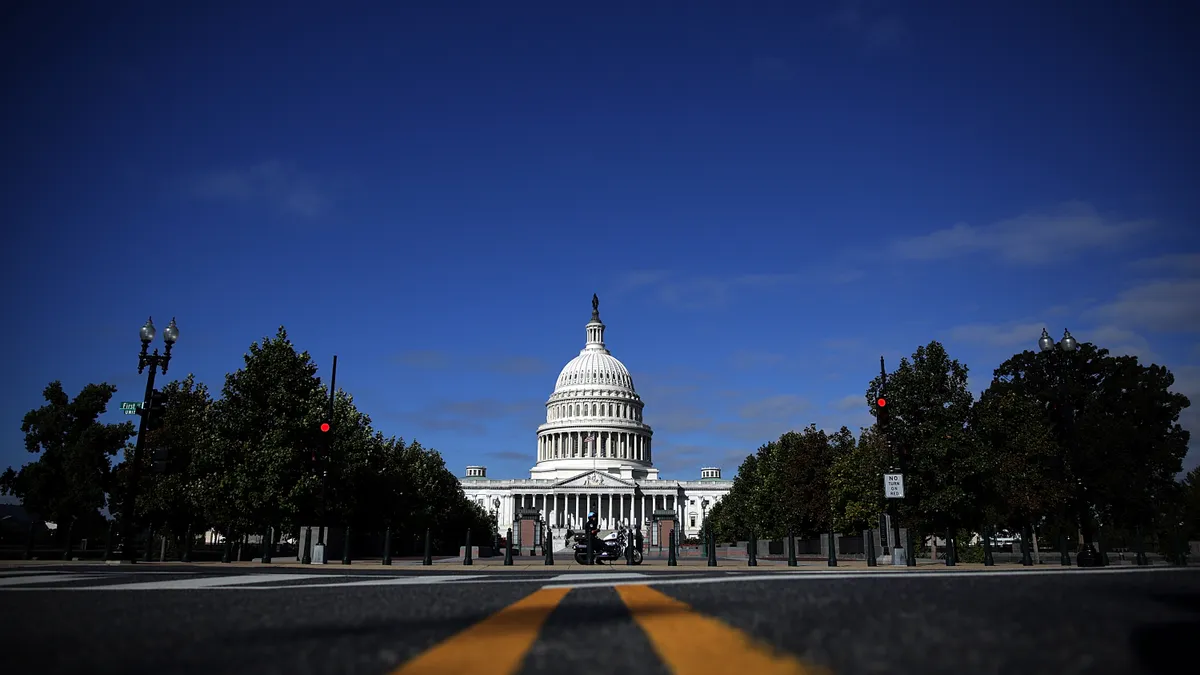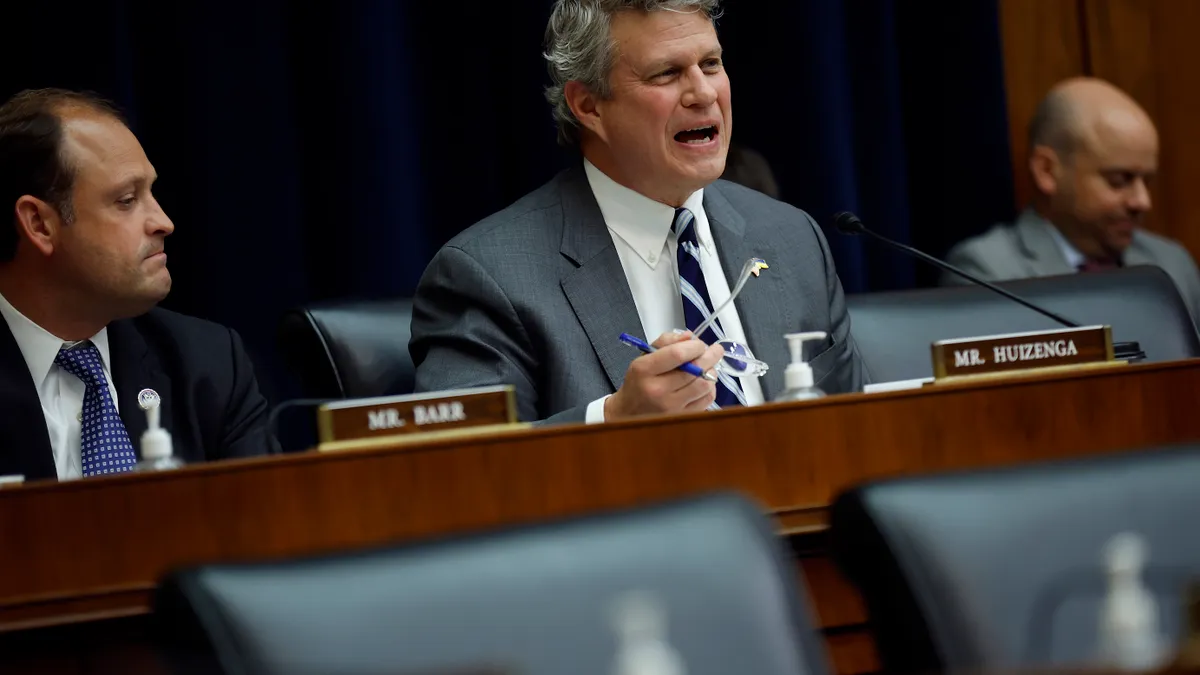After Mastercard reported its second-quarter earnings last week, the company’s CEO delivered a warning for lawmakers and Biden administration officials who have been increasing scrutiny of debit and credit fees.
On a conference call with analysts to discuss the report Thursday, Mastercard CEO Michael Miebach was asked about recent efforts to reopen discussions on enforcement of debit fee regulations. Miebach took the opportunity to give an earful on the topic of swipe fees, also known as interchange fees, and segued unsolicited into credit oversight too.
“The access to credit for middle-class Americans is going to be impacted, and not in a positive way, if this interchange regulation comes in,” he declared during the July 29 call. “It is all something that needs to be thought through very carefully — what are the puts and takes, why does this make sense.”
He noted the Biden administration is reviewing regulatory “initiatives” and pointed to lawmaker “chatter” on the subject of fees. While he didn’t talk specifically about any legislative or regulatory proposals, he made clear he believed existing debit fee regulation hadn’t benefited consumers and warned that any forthcoming credit fee regulation wouldn’t either.
The fees have been a perennial point of controversy for decades between the big card network companies, such as Mastercard and Visa, and the merchants who pay the fees on transactions when consumers use the cards. A regulatory cap put on debit fees about a decade ago has remained a hot topic of debate in the industry, and in Washington. Any suggestion of new regulation related to credit fees is similarly contentious.
Over the past year, the card companies have faced the biggest regulatory challenges in the decade since the debit fees were enacted in an amendment to the 2010 Dodd-Frank Wall Street Reform and Consumer Protection Act. Last year, the Department of Justice ramped up antitrust oversight of the industry by suing over Visa’s acquisition of fintech rival Plaid, ultimately leading the companies to abandon the deal. And the department has continued to investigate Visa’s debit program, according to a report from the Wall Street Journal this year.
Democratic U.S. Sen. Dick Durbin, who championed the amendment that put a debit fee cap in place a decade ago, railed against the industry’s ongoing exorbitant fees earlier this year, calling for more oversight of the industry. Pres. Biden, his fellow Democrat in the White House, demanded last month that there be increased antitrust scrutiny of American business in general, and he would likely be attuned to congressional concerns about specific industries.
The Federal Reserve its focused on fee regulation too, making a proposal in May for clarification of a rule that requires giving merchants access to at least two unaffiliated networks over which to run debit transactions. The Fed said there was evidence the rule hadn't been properly enforced. In public comments so far on that proposal, the clash over fees has persisted.
New "regulatory and lawmaking initiatives"
Miebach is cognizant of discussions in Washington that could affect his business. “The new administration is looking at various regulatory and lawmaking initiatives as we all know — we've just seen news about it yesterday,” he said in answering the question from Autonomous Research analyst Craig Maurer on the call.
Miebach didn’t say what news he was referring to, but Maurer said in an email that he thinks it might have been the disclosure that same day by payments tech giant PayPal that it had received subpoenas and requests for information from the Securities and Exchange Commission regarding debit interchange fees, regarding whether the cards bearing its brand were complying with legal requirements in processing transactions. “We are cooperating with the SEC in connection with this investigation,” PayPal said in the July 29 quarterly filing.
While the SEC disclosure was specifically about PayPal’s debit program, Bloomberg also reported that day that PayPal had received a civil investigative demand from the Consumer Financial Protection Bureau regarding its PayPal Credit.
Miebach sought to assure analysts on the call, and others who might be listening, that Mastercard is doing everything it can to foster positive communication with the Biden administration and lawmakers.
Leaning into the Biden administration
“From the outset, we've leaned into the new administration to build a really positive relationship so that is very good and we're continuing, obviously, the same kind of interaction and engagement on a topic as important as interchange is to our industry with lawmakers on the Hill, (in the) House and Senate, both sides of the aisle,” Miebach said. “We're monitoring this very closely.”
He went on to say that the data now available following the enactment of debit regulation a decade ago shows consumers have experienced increased costs and reduced benefits as a result of that oversight.
“We keep providing that data to lawmakers and other interested parties and figures,” he said on the call. “When it comes to interchange regulation applied to credit, you would expect the same in terms of cost impact, in terms of benefits impact.”
Detractors like Durbin argue the opposite, saying regulation is the only means by which merchants have been somewhat protected from even higher fees than they currently shoulder, and that they would otherwise be forced to pass onto consumers in the form of higher prices.
At a different point in the conversation with analysts, Miebach noted government became more interested in digital payments last year when the COVID-19 pandemic forced it to find fast, contactless ways to deliver stimulus checks to Americans. Now, he said he believes the federal government has a “heightened and elevated” interest in digital payments, given its discovery that the payments infrastructure is "dated." He noted that governments are finding they may require partnerships in the area.
“That is something that I see fundamentally as an opportunity,” he noted, adding that Mastercard would be willing to work with government “as a fair partner." He noted Mastercard is "well-positioned" with its multi-channel payments infrastructure to be of service.

















